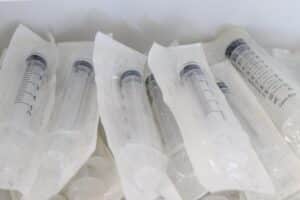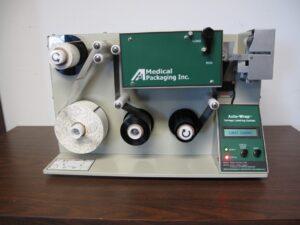Understanding the Differences: Biosimilar Drugs vs. Generic Drugs Explained
In the world of pharmaceuticals, there is a constant effort to provide patients with more affordable alternatives to brand-name medications. Two terms that often come up in this context are “biosimilars” and “generic drugs.” Both biosimilar and generic drugs are unbranded versions of existing medications offered at lower costs.
The first and most basic distinction to understand is that biosimilar drugs describe large-molecule medication. These large molecule medications are extracted from living organisms and are often overly complex medications such as vaccines. Generic drugs involve small-molecule medicines, such as aspirin, or ibuprofen, which use synthetic chemicals and are much simpler to reproduce.
Let’s walk through the distinctions between these two categories, shedding light on the world of follow-on medications and the complexities of the drug manufacturing industry.

Biosimilar Medicine Deep Dive
Biosimilars, as the name suggests, are medicines that are similar but not identical to the reference biologic medicines (brand-name drugs). What sets biosimilars apart is their origin; they are derived from biological or natural sources such as yeast, bacteria, plants, or animal cells. This category includes vaccines, blood components, gene therapies, and other complex and expensive drugs. These medicines are known for their large and intricate molecular structures, which make them challenging to replicate precisely.
While biosimilars closely resemble their brand-name counterparts, they do have differences in their active ingredients. Importantly, these distinctions have been shown to have no clinically meaningful differences or impact on their safety, purity, or potency in comparison to their reference product. The primary benefit of biosimilars is their cost-effectiveness, with drug prices typically about a third lower than the brand-name biologic products.
Generic Medicine Deep Dive
On the other hand, generic drugs are quite different. They are produced using chemical processes and are characterized by their small and straightforward molecular structures. What sets generics apart is their chemical identity; they are identical to the original branded drug in terms of active ingredients. They also must be in the same presentation, such as injectable or tablet, as the reference product. However, they may vary in terms of non-active components such as colors and flavorings, which do not affect the medicine’s performance, safety, or effectiveness.
Generics are known for being the most budget-friendly option, often available at discounts of 80-85% compared to their brand-name counterparts. Despite the lower price point, generics maintain the exact same strength as the original brand-name medication.
Key Differences Between Biosimilars and Generics
Branded drugs come in two forms: synthetic, produced through chemical processes, or biological, derived from living sources. While synthetic branded drugs can be perfectly duplicated as cheaper generic versions due to their simple chemical structures, the intricate nature of biologics involves large, complex molecules that cannot be replicated with the same level of precision.
Cost
The prices of biosimilars and generics offer substantial cost savings compared to brand-name drugs. Generics are typically the most affordable option as they do not require extensive testing, manufacturing, and other development costs. High generic competition also contributes to low costs. Biosimilars, while still cost-effective, require some testing in the approval process, although at a much lower cost and time investment than the development of brand-name biologic drugs.
Stability
One notable difference lies in the stability of these medications. Biosimilar products, being biologically derived, are generally less stable than chemical-based pharmaceuticals. As a result, they often require cold chain distribution and have a shorter shelf life. This is where companies like Medical Packaging Inc., LLC play a crucial role by providing innovative packaging solutions that extend the shelf life of biosimilars.
Efficacy
While biosimilars are highly like their reference biologic medications, they may not have identical efficacy due to the inherent differences in their molecular structures. However, it is essential to emphasize that these minor differences are not clinically meaningful and do not compromise patient safety or treatment effectiveness. Generic drugs use the same active ingredient and thus have the same efficacy.
Packaging
Another distinction lies in the packaging requirements. Biological products often come in liquid or cream forms, requiring specialized packaging solutions that can accommodate these unique formats. In contrast, generic drugs are typically packaged in more conventional forms like pill bottles. Both need unique and accurate labeling for patient safety. Reliable packaging equipment is pivotal in addressing these diverse needs, providing innovative packaging solutions tailored to the unique characteristics of both biosimilars and generics, ensuring their safety, effectiveness, and market accessibility.
Development Process
The complex process of developing biosimilars is more intricate and costly than that of generics. According to the National Library of Medicine, developing a biosimilar can take between seven to eight years and cost more than $100 million with clinical studies and extensive testing. In contrast, a generic drug can be developed for much less, around 1-4 million, as clinical trials are not required because the dosage and ingredients have already been tested by the brand name. These cost approximately $1-2 million and can be developed in about two years depending on the drug.

Implications in the Medical/Pharmaceutical Industry
Manufacturers
One of the major challenges in the pharmaceutical industry is the complexity of manufacturing biologics and biosimilars. Companies with experience in manufacturing biologics have a considerable advantage over new entrants without such experience. This expertise is critical in ensuring the quality and safety of these medications and creates a large barrier to entry for smaller or inexperienced biosimilar manufacturers. Due to the barrier to entry, biologics price competition remains relatively low.
Specialty Pharma
Many of the generic and biosimilar drugs fall under the specialty pharmaceutical category due to their complexity and their ability to treat serious medical conditions. These medications often aim to undercut the high price tag of brand-name drugs, making them a valuable asset in the industry. Experts predict significant growth in the development and utilization of these specialty medications in the coming years.
Insurance Companies
Insurance companies have a vested interest in promoting the use of generics and biosimilars as they can significantly reduce healthcare costs. They often encourage doctors to prescribe these more affordable alternatives to brand-name drugs, which, in turn, benefits patients by making essential medications more accessible.
Patients
For patients who cannot afford brand-name medications, generics and biosimilars offer a lifeline. These more affordable options ensure that vital treatments are accessible to a more extensive population, improving overall public health. Patients should always ask their doctors if a generic or biosimilar product exists for their prescribed medication as it could save them money on many prescription drugs.
Healthcare Providers
Doctors typically lean toward prescribing generic drugs unless patients specifically request brand-name medications. Similarly, they are inclined to prescribe biosimilars unless they have reservations about their efficacy for a particular patient.

Manufacturing & Packaging Biosimilars vs Generic Drugs
MPI’s Role in Packaging Biosimilars
Medical Packaging Inc., LLC (MPI) plays a vital role in addressing the unique packaging challenges of biosimilars in the United States. They offer innovative packaging solutions for oral liquid medications, ensuring that these biological medicines maintain their efficacy and safety. With products like FD Pharma® and Fluidose®, MPI ensures speed to market, maintains the efficacy of biosimilars, and caters to both low-volume and high-volume production needs. MPI’s packaging options have compliant FDA approval and provide the necessary quality assurance for biosimilars.
MPI’s Role in Packaging Generics
MPI also contributes to the packaging solutions for generic drugs. They offer oral solid packaging solutions that are designed to meet the specific needs of generic medications. Products like Auto-Print® streamline the packaging process, ensuring efficiency and precision in the production of generic drugs in many market settings.
In conclusion, biosimilars and generics both offer valuable alternatives to brand-name medications, each with its own set of advantages and challenges. Understanding these distinctions is crucial for healthcare professionals, patient access, and the pharmaceutical industry. MPI plays a significant role in ensuring the safety and effectiveness of these medications through innovative packaging solutions. As the pharmaceutical landscape continues to evolve, these cost-effective alternatives will play an increasingly essential role in providing accessible healthcare options for all.
Contact MPI to learn more about our generic and biosimilar packaging solutions.
References
PDF, Download. “The Benefits and Drawbacks of Biosimilars.” Hematology Oncology, www.hematologyandoncology.net/archives/october-2015/the-benefits-and-drawbacks-of-biosimilars/. Accessed 8 Dec. 2023.
Center for Drug Evaluation and Research. “Generic Drugs: Questions & Answers.” U.S. Food and Drug Administration, FDA, www.fda.gov/drugs/frequently-asked-questions-popular-topics/generic-drugs-questions-answers. Accessed 8 Dec. 2023.
Biosimilars Info Sheet – U.S. Food and Drug Administration, U.S. Food and Drug Administration, www.fda.gov/media/154912/download. Accessed 8 Dec. 2023.
Sonia T. Oskouei, PharmD. “Five Key Things Pharmacists Need to Know as Insulin Biosimilars Come to Market.” Pharmacy Times, Pharmacy Times, 29 July 2021, www.pharmacytimes.com/view/five-key-things-pharmacists-need-to-know-as-insulin-biosimilars-come-to-market.
Skerrett, Patrick J. “Generic Drugs: Don’t Ask, Just Tell.” Harvard Health, 8 Jan. 2013, www.health.harvard.edu/blog/generic-drugs-dont-ask-just-tell-201301075766#:~:text=Up%20to%20half%20of%20physicians,their%20patients%20ask%20for%20it.
Contact MPI Today for Personal Assistance
MPI’s Drug Master File provides speed-to-market regulatory and technical support related to our packaging components for medical and pharmaceutical market clients